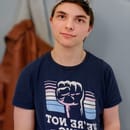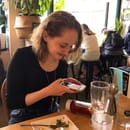This article has been written as part of a series to honor National Coming Out Day in collaboration with the Kutztown University LGBTQ+ Resource Center. National Coming Out Day exists because coming out is difficult, to put it mildly. Most LGBTQ+ people worry to some extent about negative reactions from loved ones, and many still fear workplace or housing discrimination. The aim of the series is to share stories of people with less represented identities or coming out stories, and to foster the kind of understanding and compassion that can reduce that fear.
Storm is a former KU student who graduated in the spring of 2020. She told me that she identifies as bisexual and asexual, which for her means “romantically, I’m attracted to multiple genders. Sexually… not really? Like, I just don’t get it.” She later elaborated, “I can appreciate someone looking good, but that doesn’t mean I want to jump in bed with them.”
She realized she was bi in her senior year of high school after a friend came out to her as transgender. “It was kind of a weird thing to come to terms with, because up until then I hadn’t really considered anything like that. It was never something I really talked about or was talked to me about until my senior year, because my friend came out to me as trans.” She didn’t know about trans people until then, so learning about her friend’s identity sparked curiosity about her own identity. After that, “I started thinking about things like, ‘Huh… Okay. Alright.’” She explained that it wasn’t a matter of not knowing about herself. “I’ve always had a sense of self, it’s just a matter of finding words to explain what that is.”
Storm came to understand her asexuality in a similar way. A couple of years after the first revelation, her best friend came out to her asexual and explained what it meant, and she started to consider that the term might also apply to her. “I kind of waffled at it for a couple of years and thought maybe I’m demi.” Demi is short for demisexual, which describes a person who can only experience sexual attraction to people with whom they’ve formed an emotional bond. During that waffling, she was afraid, not of her own identity, but about the reactions she would receive if she came out as asexual.
When she came out as bisexual to her mother through a letter, her mother’s reply had included a comment about seeing a therapist (that Storm acknowledges as well-intentioned but poorly timed). And when gay marriage was federally legalized in 2015, her father had made negative comments, all of which has made her hesitant to come out as ace. She told me, “I don’t think I ever actually officially come out to anyone as ace.” She explained that she doesn’t come out as ace primarily because most people don’t seem to understand. “We’re a very sexualized society. Just look at magazine ads, a lot of them are very, very sexualized, especially towards women, and even towards men when you see all those ripped guys with their abs showing and everything. It’s a very sexualized society, and in a place like that it’s hard for people to understand someone not wanting sex ever.” As a result, explaining to people often doesn’t seem worthwhile. “If I don’t think you’ll understand it, even if we’re really close, it’s on a need-to-know basis, because it doesn’t affect who I am. I don’t owe it to anyone to say what I do and don’t do in bed.”
Even more heavy than the weight of people not understanding is the concern about trust and safety. Especially in the beginning, she worried when coming out, “How much can I trust this person, because it still can be very dangerous, even if it’s a more accepting society these days. If you tell the wrong person, next thing you know, I could be one of those people on Facebook that ‘This person got attacked by a bunch of people on a bus and had to go to the hospital,’ or ‘This person got killed because of who they were’.”
Why then, would she share her asexuality in an article that will be read by a bunch of people? Over time, her thought process about coming out has changed. “I want to be that person who people say, ‘Oh yeah, that’s that person, but they also happen to be bi as well,’ or ace as well if I happen to tell them that. I want to normalize it.” For Storm, being out in and of itself is a form of activism that she is proud of.
Education, she says, is also important. To people who are being come out to, she recommends using sources like, the Trevor Project, Psychology Today, stonewall.org, and asexuality.org to learn more. She also advises that people in that situation, “Be as supportive as possible, because it takes a lot of guts no matter how many times you do it. Say ‘Thank you for telling me.’ They did the hard part by telling you. It doesn’t hurt you at all to do a little bit of your own research and say, ‘I want to understand. I want to support you, show me how.’”
One of Storm’s biggest motivators is to be a role model and big-sibling figure for other ace people, especially those who are struggling with their identities. Her advice to them is, “You’re normal. Sexual attraction might be in abundance in society, but that doesn’t mean not having sexual attraction doesn’t mean you’re broken. Just because you’re different than “normal people” doesn’t mean there’s something wrong with you, and it’s okay. That’s definitely one thing I needed to tell myself a lot at first. There are a lot of people out there who are similar, even if they don’t realize it yet. You’re not alone, it’s okay. You’re normal.”



